Key takeaways:
- Financial readiness involves understanding your credit score, debt-to-income ratio, down payment, emergency fund, and monthly budget, which are crucial for informed decision-making.
- Researching the housing market helps identify suitable neighborhoods and market trends, providing insights that guide buying strategies and foster a connection to potential homes.
- Negotiating effectively requires balancing personal desires with the seller’s perspective, emphasizing emotional connections and flexibility beyond mere financial transactions.
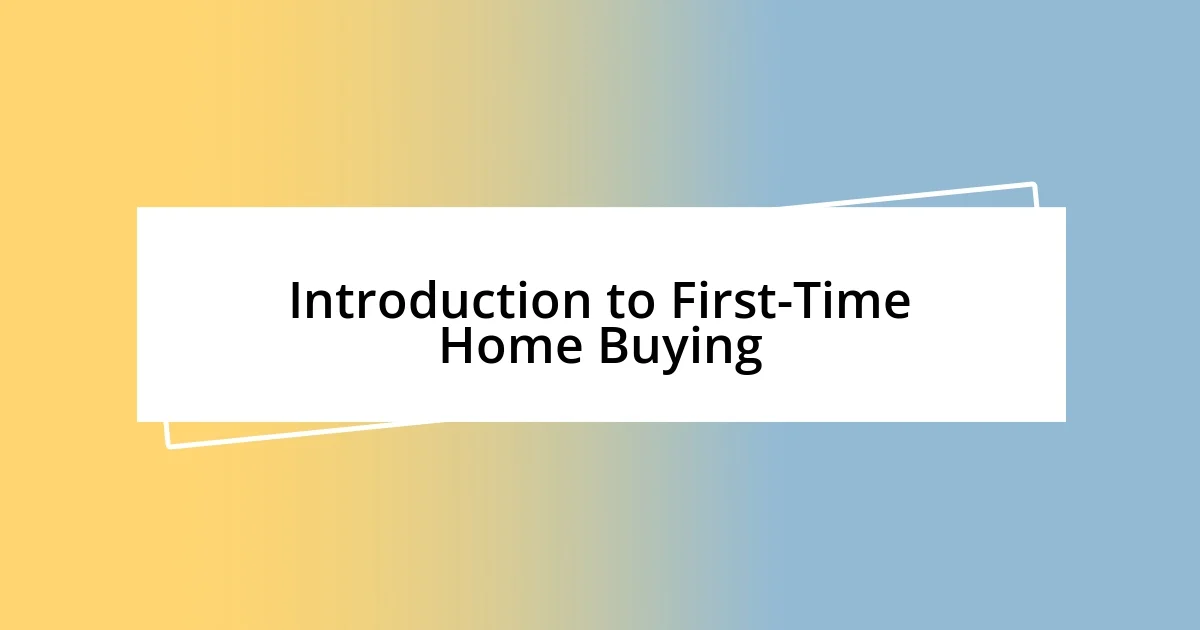
Introduction to First-Time Home Buying
Buying your first home is a significant milestone and often a blend of excitement and anxiety. I vividly remember the whirlwind of emotions I experienced when I saw my dream home for the first time. Could this be the place where I’d create lasting memories?
Navigating the real estate market can feel overwhelming. I found myself constantly questioning whether I was making the right choices and if I would ever find a home that felt just right. Have you ever felt that way? The pressure is real, but knowing it’s part of the journey can ease some of that burden.
Ultimately, first-time home buying is a rite of passage that comes with a unique set of challenges and rewards. I learned that patience is just as important as knowledge. Looking back, I realize how much I grew during the entire process, feeling a mix of fear and triumph with each step I took toward homeownership.
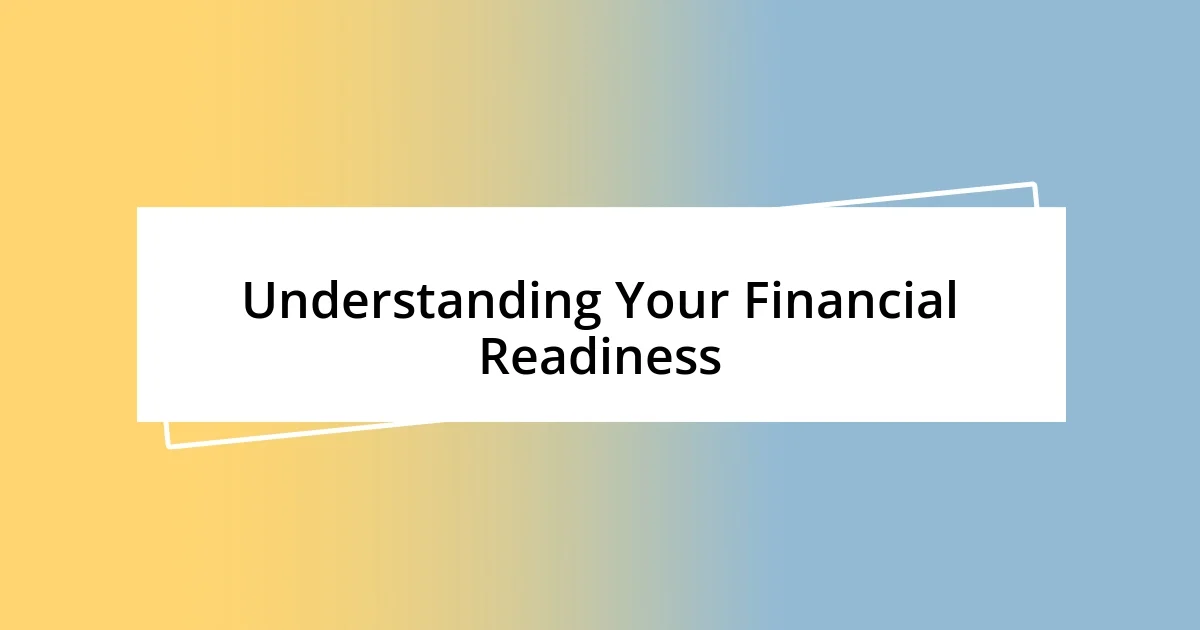
Understanding Your Financial Readiness
Understanding your financial readiness is more than just checking your bank balance; it’s about having a clear grasp of your overall financial health. I remember sitting at my kitchen table, staring at spreadsheets, trying to make sense of my income, debts, and savings. It was a moment of clarity that opened my eyes to what I truly could afford. This process might seem daunting, but it’s crucial for making informed decisions that won’t haunt you later.
Here are some key points to consider when assessing your financial readiness:
- Credit Score: A good score can unlock better mortgage rates. I was surprised to learn how much my score impacted my offers.
- Debt-to-Income Ratio: Lenders typically prefer a ratio below 43%. Calculating this helped me understand my limits.
- Down Payment: Aim for at least 20% to avoid PMI (Private Mortgage Insurance). The thought of saving that much felt intimidating at first, but breaking it down into manageable steps made it achievable.
- Emergency Fund: Having three to six months’ worth of expenses saved is critical. I found comfort in knowing I had a safety net in place after my purchase.
- Monthly Budget: Include all potential home expenses, from utilities to maintenance. Once I mapped that out, I felt more confident about what I could financially commit to.
This reflective process not only prepared me for homeownership but gave me peace of mind, knowing that I was on solid ground.

Researching the Housing Market
Researching the housing market was an eye-opening experience for me. I remember spending countless evenings scrolling through listings, trying to differentiate between homes that were worth considering and those that were not. It felt like trying to find a needle in a haystack. With so much information available, I often wondered how I could filter through the noise to truly understand what would suit my needs.
I found it useful to break down my research into key areas. For instance, learning about the neighborhoods was crucial; I wanted a community that reflected my lifestyle and preferences. I wasn’t just looking for a house; I was looking for a place I could call home. I vividly recall visiting open houses and chatting with neighbors, gaining insights that online searches couldn’t provide. It’s these conversations—sharing a laugh with a neighbor or getting the scoop on school districts—that painted a real picture of the area. This direct engagement made me feel more connected to my potential future home.
Another significant aspect I leaned into was analyzing market trends. I realized that knowing whether a market was hot or cooling off could influence my buying strategy significantly. For example, during my search, I noticed some areas were appreciating rapidly, but I also discovered others where the prices were more stable, giving me a sense of security. Coupled with neighborhood data, this trend analysis helped me formulate offers that felt right without overextending my budget.
| Aspect of Research | My Experience |
|---|---|
| Neighborhood Insights | Creative chats with residents enhanced my understanding of the community’s vibe. |
| Market Trends | Recognizing fluctuations informed my timing and negotiation strategy. |
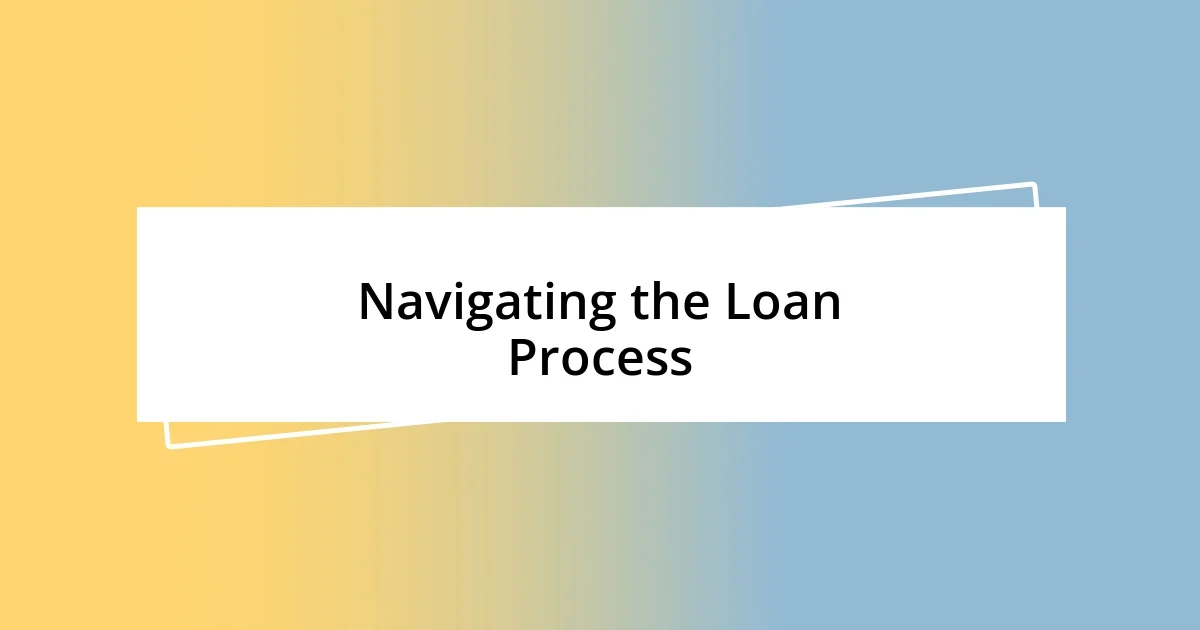
Navigating the Loan Process
Navigating the loan process can feel like wandering through a maze without a map. I vividly recall my first meeting with a loan officer; their jargon made my head spin. Terms like “pre-approval” and “interest rates” were new to me. I learned quickly that securing a pre-approval letter is essential because it gives you a clear picture of how much you can borrow and shows sellers you’re serious. That initial anxiety transformed into excitement as I understood the pivotal role this step played in my home-buying journey.
As I moved forward, I encountered various loan options. Did I want a fixed-rate mortgage or an adjustable-rate mortgage? I found myself leaning toward the fixed-rate option for peace of mind, knowing my payments would remain consistent. However, the complexities didn’t stop there. It’s overwhelming to decipher the true cost of a loan beyond just the interest rate. I remember sitting with a lender, who often explained how closing costs, private mortgage insurance, and other fees quickly add up. Having a trusted advisor to break this down made a world of difference; I realized I wasn’t just looking for a loan but a partner in my home-buying journey.
Once I finally selected my loan, the paperwork began to pile up. I swear I was signing documents for days! I had to gather tax returns, proof of income, and bank statements—it felt never-ending. But here’s the thing: each signature brought me closer to my dream home. I recommend keeping organized with a checklist to manage all your documents. There were moments of frustration, but when I finally received the approval, the joy of moving forward was indescribable. I became more than just a buyer; I was on the brink of a new chapter in my life.
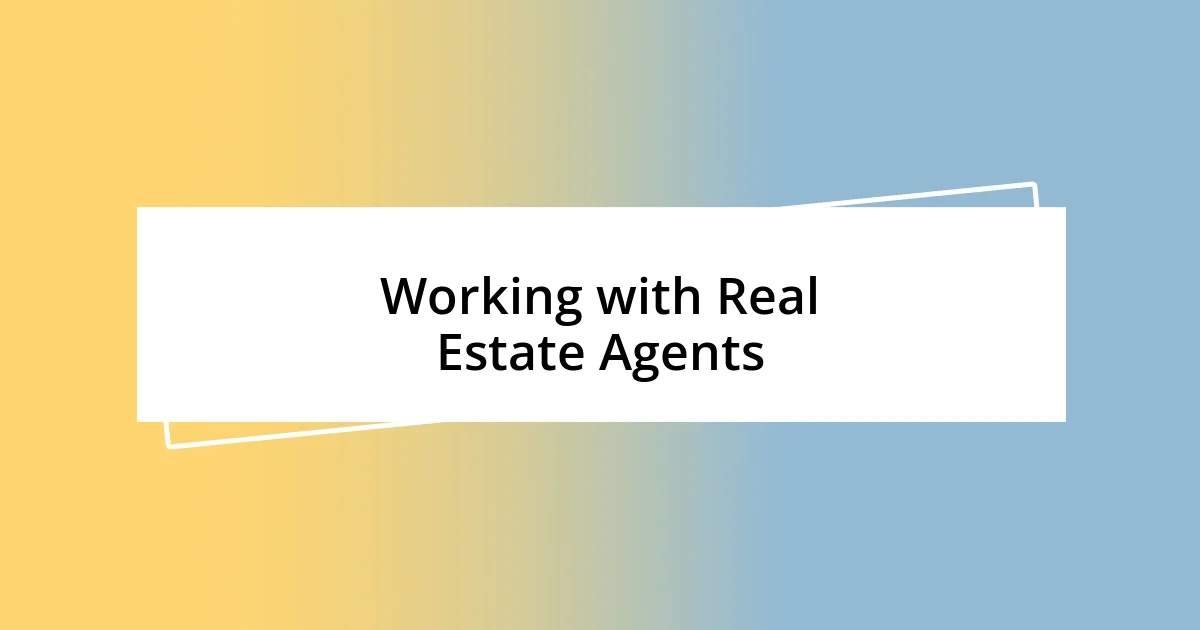
Working with Real Estate Agents
Partnering with a real estate agent made an enormous difference in my home-buying experience. From the moment I reached out, my agent was like a guiding light through the sometimes murky waters of purchasing a home. I remember feeling a sense of relief when they explained the buying process step by step, demystifying all the intimidating jargon I’d encountered during my research. Isn’t it comforting to know there’s someone in your corner, ready to help clear the confusion?
As I started visiting properties, my agent’s insights proved invaluable. They not only pointed out potential red flags but also highlighted features I wouldn’t have considered on my own. For example, they showed me why a house with a south-facing backyard could be more appealing due to its natural sunlight. Reflecting on that moment, I realized it wasn’t just about finding a house; it was about finding a home that would fit my life’s rhythm. It truly felt like my agent was invested in my happiness, not just closing a sale.
One of the most memorable moments was during negotiations. I had fallen in love with a charming little bungalow, but the asking price made me hesitate. My agent reassured me, providing market comparisons and thoughtfully guiding me through crafting a competitive offer that still felt right. I had to remind myself that this journey wasn’t just about the numbers; it was about securing a place where I could build memories. Ultimately, having an experienced agent by my side made the entire process feel both less daunting and more exciting.
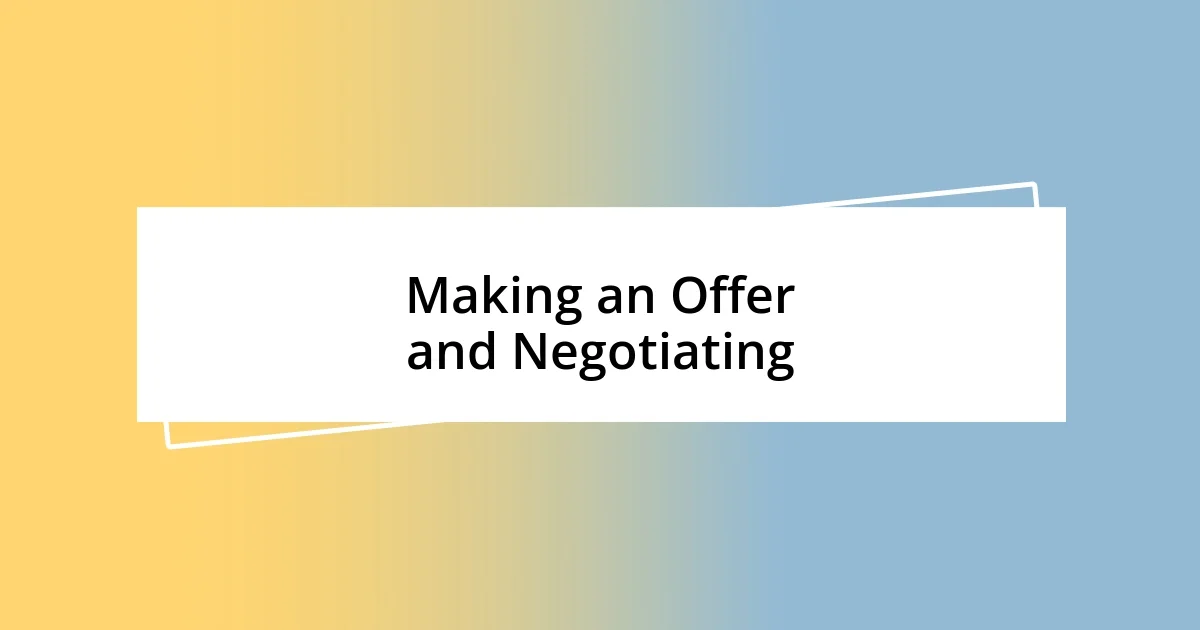
Making an Offer and Negotiating
Making an offer on a home felt like a leap of faith, and I certainly needed that push. I still remember how nervous I was drafting my first offer. With a competitive market, I had to balance how much I loved the home while staying within my budget. It was a critical moment—was I ready to risk losing my dream home by being too cautious?
Negotiating didn’t just feel like haggling over price; it was more about understanding the seller’s perspective. I learned that what they valued might not be just the dollars but also timing and flexibility. For instance, when I expressed my willingness to accommodate their timeline for moving out, I saw their faces lighten. It was eye-opening to realize how a personal touch in negotiations could foster a sense of trust, transforming a transactional exchange into something more meaningful.
In the end, I ended up offering a little above the asking price, and it felt right. Yet, the experience was not just about financial decisions; it was filled with anticipation and a sprinkle of anxiety about the unknown. That final negotiation taught me that home-buying isn’t just a series of numbers—it’s a journey where emotions play an equally important role. Have you ever felt that tug-of-war between your heart and your head? It’s a very real part of making a home yours.
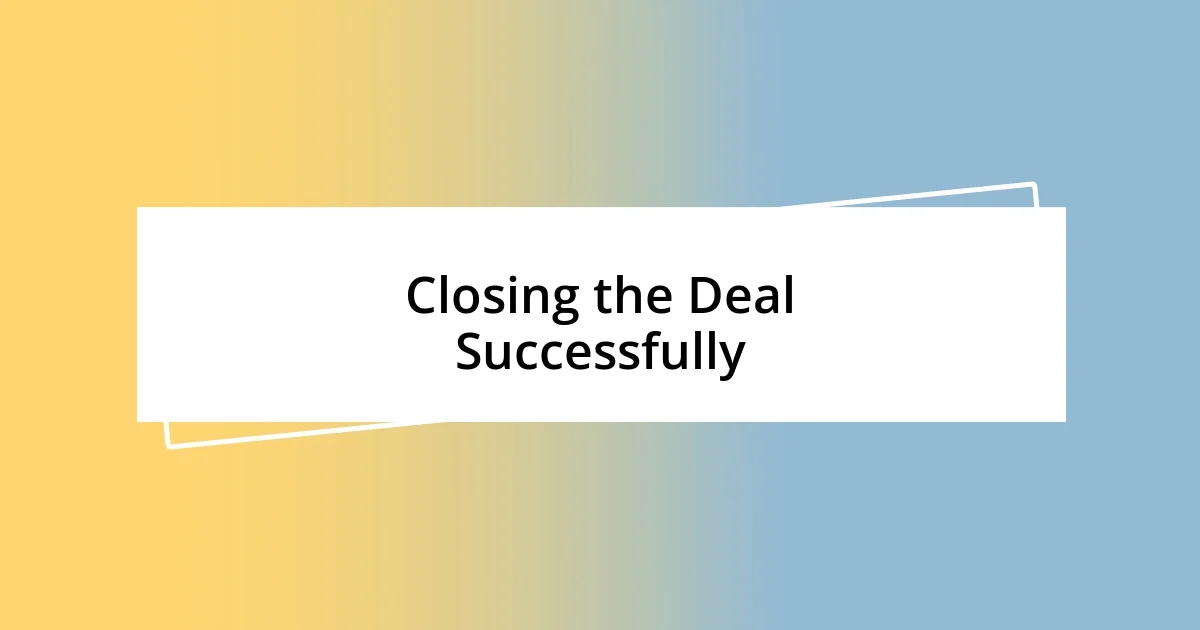
Closing the Deal Successfully
Closing the deal on my first home was a whirlwind of emotions, excitement mixed with a palpable sense of urgency. I was anxious about ticking all the boxes before the closing date. I remember pacing around my living room, rehearsing my closing speech in front of a friend—would I really be ready for this big commitment? As it turned out, feeling prepared was just as crucial as having the paperwork in order.
Once the final walkthrough approached, I felt a rush of adrenaline. I’d envisioned this moment countless times, yet there’s something surreal about standing in a space that will be your home. I can vividly recall checking every little detail—sinks, doors, even windows—ensuring everything was in order. What if they had missed fixing something? It’s a potent reminder that taking the time to inspect before closing could save future headaches.
The closing day itself was a mix of joy and tension, surrounded by a stack of documents that seemed to grow taller by the minute. I felt a wave of relief wash over me as I signed the final papers—every signature brought me closer to being a homeowner. The celebratory moment when I received the keys felt surreal, almost like a rite of passage. Reflecting back, I realize that closing the deal wasn’t just a business transaction; it was the culmination of ambition, hope, and new beginnings. Can you recall a moment in your life when you felt both scared and exhilarated? That’s exactly how I felt in that office filled with paperwork and possibilities.














